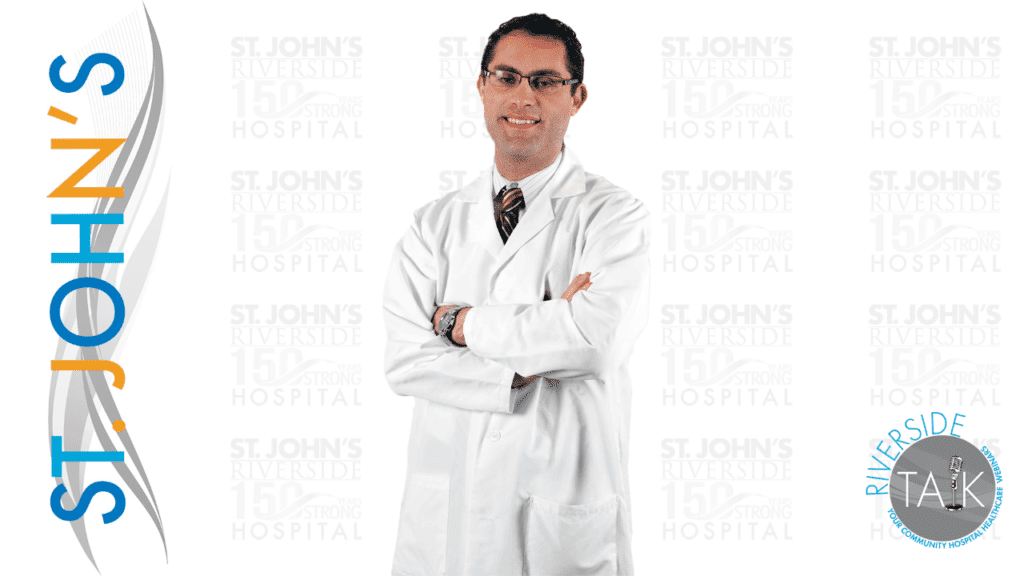
“ Lifestyle changes can improve your blood pressure more than cholesterol, but they work for both.”
Dr. Alon Gitig
Watch the webinar here—https://www.youtube.com/watch?v=AuP8-1p2Cj4&t=12s
By Dan Murphy
On September 7, St. John’s Riverside Hospital and Cardiologist Dr. Alon Gitig presented a ‘Listen to Your Heart’ webinar. During the discussion, Dr. Gitig discussed ways to monitor and control cholesterol and blood pressure.
The discussion focused on two ways patients can develop heart disease, Cholesterol, and high blood pressure. “There is a lot of inaccurate information about cholesterol. First, cholesterol in the right amounts and in the right places is not dangerous. We need it there in our body, and it serves several biological functions in our cell membranes, hormones, and the brain.
“A newborn baby, who hasn’t yet been introduced to fast food, has cholesterol. The problem becomes when cholesterol gets into the wrong places when we see it in large amounts in the bloodstream,” said Dr. Gitig, who explained that Cholesterol is measured in the body through LDL, also known as ‘bad cholesterol.’ Another form is ‘good cholesterol’ or HDL. All of us have both types.
“The reason we call them good and bad cholesterol is this: Both are floating in our blood at all times and are carried through the arteries. But the LDL particles will move through the artery walls, and some get lodged in the artery and form plaque.
“HDL particles carry cholesterol but don’t get stuck in the artery walls and can’t cause plaque. Everyone wants more HDL, and less LDL. HDL takes from other particles and brings it back to the liver where it is excreted through the bile. The more HDL, the better off you are,” said Dr. Gitig.
“Only a small amount of total cholesterol in your GI tract comes from your diet. A much larger percentage is what gets carried there through the bile. So for most people, eating food high in cholesterol (egg yolks, shrimp) does not lead to much if any elevation in the blood level of cholesterol. It is possible to have some high cholesterol if you are fit and eating well, through genetic variations that produce too much cholesterol or absorb it from the intestines too rapidly.”
One of Dr. Gitig’s main themes in the webinar was that there is no “one cure” for all patients. Only through examinations and analysis of test results can a patient and their doctor be confident in the best path towards better health and preventing heart disease.
Patients can determine their cholesterol levels through an LDL test, with the average LDL range of 125-130 for patients. Dr. Gitig explained that in industrial societies like the United States, 130 is a typical LDL number, but “in other parts of the world that live much more traditional lifestyles (areas of rural China and Japan, certain indigenous populations of Central and South America) whose people almost never develop arterial disease, typical levels are much lower. The people living in those regions tend to have LDL cholesterol values in the 50-90 range. These tribal and hunter-gatherer societies don’t get plaque in their arteries; it doesn’t exist in this group.”
Dr. Gitig said that medications to help control cholesterol, the most common of which are known as statins, are useful in some patients. “Statins are worth taking after examination and consultation with your doctor. I have become convinced that our bodies should be at lower levels of cholesterol, and if patients are walking around with a 120-130 LDL level, statin medication will usually reduce the statistical probability of developing heart disease.”
These medications reduce artery disease not just by lowering cholesterol but also by significantly reducing oxidative stress and inflammation inside the walls of the arteries, biological processes that are necessary in order for plaque to progress and heart attacks to happen.
When asked about the negative press attached to some statins, Dr. Gitig said any instances of side effects are “the exception and not the rule, and that the side effects can be easily detected and medications changed if you are monitored regularly by your physician.”
What about the different foods we eat and their impact on our cholesterol? “Saturated fat, and fatty acids, found in milk, yogurt, butter, fatty beef, and dark meat chicken, for most people will negatively affect your cholesterol. But egg yolks, and shrimp, which are high in cholesterol content, typically do not impact it. These foods, and lean beef, contain healthy nutrients and can be helpful for some people, as long as your doctor monitors your bloodwork to ensure they aren’t having adverse effects on your cholesterol levels.”
Dr. Gitig was also asked about homeopathic or holistic ways to reduce cholesterol. “Not many will have a major effect on your cholesterol. They have to be taken in large amounts (much higher than listed on the standard bottle label) and may not see enough LDL reductions.”
“The best way to reduce cholesterol is to diet, exercise, and lose weight. We don’t know how to predict every person, but if you try that for 2 or 3 months and then come back for another test, it will often help.”
Blood Pressure and its effects on heart disease were also discussed by Dr. Gitig, who explained that the two numbers in a blood pressure reading, top, and bottom, are generated by your heart when it is pumping (top number) and when it is relaxed (bottom number).
“Both numbers are important, and 115 on top is a number that is associated with the lowest risk of heart attack and stroke for those who naturally have that reading without medications. We have evidence that pharmacologically treating patients with numbers above 130/80 and trying to get those numbers lower will prevent heart attack and stroke,” said Dr. Gitig.
“But prescribing medications should be based on each patient and their risk. If I have a patient with a history of bypass, or a stent, for example, I may try harder to get their numbers below that 130/80 threshold.
A coronary calcium scan is useful to see if you have more plaque in your heart arteries than other people your age. Often the reasons for high blood pressure are the same for most patients; they are overweight and not exercising enough. Or they are not sleeping enough and are too highly stressed. And their salt and sugar intake is too high.
Lifestyle changes can improve your blood pressure more than cholesterol, but they work for both.
Final Question: At what age should we start to monitor our blood pressure and cholesterol levels? “I lean towards a person that has a potential life expectancy of another 30 years; if they want to make sure that they never develop artery disease, the only way to be sure is to start early. Early intervention is important and almost everyone can and should try lifestyle changes first.
“If I have a patient that is 45–50 years old, they have a long time to live. It’s a good idea to get things under control, and the best way to start is with diet and exercise. I would work on that for 6 months and reevaluate. Then, the patient can say they’ve done their best, and then we have a decision to make about medicine. You always want to err on the side of lowering a patient’s risk and lowering their LDL and BP numbers. The lower number is better for both, but there is not one answer.
Denise Mananas, Vice President for External Affairs at St. John’s Riverside Hospital, served as the moderator. Watch the webinar here-https://www.youtube.com/watch?v=AuP8-1p2Cj4&t=12s
Dr. Gitig is the Director of Cardiology for Mount Sinai Doctors Westchester and the Medical Director of the Mount Sinai Heart Failure Alliance. He is a non-invasive cardiologist with 15 years of experience managing all forms of chronic cardiac diseases. He has been recognized by his peers for his expertise in the field for each of the last 7 years, as a Castle Connolly Top Doctor selection, and has been honored in Westchester Magazine and New York Magazine for these achievements.
Dr. Gitig’s clinical passion is in the prevention of disease. He is particularly interested in lifestyle changes that improve the function of our heart and arteries and which have results that go beyond the effects of prescription medications. His practice focuses on nutritional interventions, exercise, stress management, and sleep optimization to achieve optimal targets for lipid levels and blood pressure and also help to optimize patients’ blood glucose and insulin balance, as well as systemic inflammation in the body. All of these factors can have a marked impact on our likelihood of developing cardiovascular (and other) diseases over the course of our lifetime.
Dr. Gitig believes that by using state-of-the-art diagnostic tools, it is possible to personalize the assessment of an individual’s risk for disease, as well as tailor interventions to those that are most likely to benefit a given person. In his experience, this approach is far more powerful than one-size-fits-all lifestyle or prescription advice.
He practices in Westchester County, NY (Yonkers and Scarsdale locations) and sees patients both in person and via video visits.





